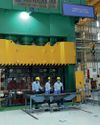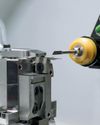
LAST NOVEMBER, THE COP26 CLIMATE Summit brought back to the table something that the pandemic itself has highlighted and even accelerated - the urgent need to address fundamental transformations in current urban mobility patterns. The way we move around today is clearly unsustainable intense congestion, environmental imbalance, and the serious impact that pollution has on the well-being of the population. Urban centres generate 70% of global greenhouse gas (GHG) emissions, and road transport accounts for 12% of them, according to the International Energy Agency and C40 Cities.
India is the fifth largest car market in the world and has the potential to become one of the top three in the near future-with about 40 crore customers in the need of mobility solutions by the year 2030. Speaking at the world leaders' summit at the UN conference in Glasgow, Prime Minister Narendra Modi pledged that India will reach net zero emissions by 2070.
To ensure a positive growth rate towards achieving India's Net Zero Emissions by 2070, a transportation revolution is required in India which will lead to better walkability, public transportation; railways, roads, and better cars. There's no mystery about why we pay such close attention to the ups and downs of the auto industry-its extended value chain is an essential engine of global economic growth.
We spoke with Kamal Bali, President & Managing Director, Volvo Group, India about why it is necessary to rethink the current mobility model and seek formulas that allow us to move around in the most flexible, efficient, and cleanest way possible, rationalising the use of the private vehicle.
Sujatha Vishnuraj (SV): Volvo Group is actively engaged in national priorities such as Make in India, Smart Cities, Electromobility, and New Road safety policies. Could you tell us Volvo's role in Atmanirbhar Bharat?
This story is from the May 2022 edition of Manufacturing Today.
Start your 7-day Magzter GOLD free trial to access thousands of curated premium stories, and 9,000+ magazines and newspapers.
Already a subscriber ? Sign In
This story is from the May 2022 edition of Manufacturing Today.
Start your 7-day Magzter GOLD free trial to access thousands of curated premium stories, and 9,000+ magazines and newspapers.
Already a subscriber? Sign In

Optimising milling operations
Exploring innovative strategies that are reshaping the milling landscape to meet the challenges of a competitive global market.

The path to excellence
Tata AutoComp’s Double Deming triumph is testament to quality and innovation

Boosting India's energy efficiency with advanced low voltage motors
Stefan Floeck, Division President of IEC Low Voltage Motors at ABB Motion, discusses the role of low voltage motors in India’s industrial future.

The Tech of E-commerce
Technology is revolutionising e-commerce by enhancing demand forecasting, inventory management, and customer experiences through AI, blockchain, IoT, and real-time data analytics.

Driving Sustainability and Innovation
A conversation with Rajendra B Chunodkar, President Manufacturing Operations, Lupin

The evolution of machining technologies
The evolution of machining technologies is reshaping the manufacturing landscape, offering unprecedented opportunities for efficiency, precision, and sustainability.

Transforming the future of manufacturing technology
A pre-event report on IMTEX 2025: The premier manufacturing and metal cutting technologies event for

THE MAKE IN INDIA JOURNEY
An analysis of the initiative's impact on the manufacturing sector.

Tata Motors Re.Wi.Re: Innovation meets responsibility
Tata Motors advances circular economy via Re.Wi.Re scrapping facility.
After Apple, Google Pixel set to be manufactured in India
Dixon Technologies' alliance with Compal Electronics is poised to further accelerate India's push to become a global hub for smartphone manufacturing.